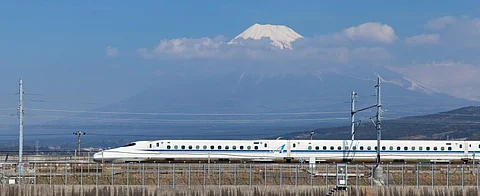

Environmental activists opposed to the proposed Bullet Train corridor between Mumbai and Ahmedabad have written to Katsuo Matsumoto, the chief representative of the Japanese International Co-operation Agency (JICA)
The have asked him to share the report on the Bullet Train Project that has been submitted to the respective Indian and Japanese governments along with National High Speed Rail Corporation Ltd (NHSRCL).
The report was prepared after JICA representatives had visited Gujarat and Maharashtra in December 2018 and January 2019 regarding violations in the Mumbai-Ahmedabad High Speed Rail (MAHSR) Project and other related issues.
The letter, written on behalf of the Paryavaran Suraksha Samiti by activists Rohit Prajapati, Swati Desai and Krishnakant, said sharing of details and documents would facilitate addressing the concerns of both, affected village residents and social organisations in a timely, transparent and comprehensive manner.
A large number of farmers are resisting acquisition of their lands for the project and have approached the Gujarat High Court on the issue of acquisition and compensation for which, a judgement is awaited any time after the summer vacations.
On the other hand, activists and social organisations are raising the issues pertaining to the environment and social impact of the MAHSR project. They say there have been blatant violations of norms on both these counts.
The letter states, “As you would know, such high impact projects are of grave concern not only to the project-affected local people but also to the entire global community, including citizens of Japan. We must uphold the universal human rights, principles, and laws related to environmental protection and social justice.”
In the letter, the activists have recalled the issues that they had taken up with JICA, including the pointers for the Indian government.
On July 9, 2018, they had questioned why the Union Ministry of Environment, Forest and Climate Change (MoEF&CC) was absent when a foreign government agency was participating in environmental consultations.
They had also said if the ongoing consultations accepted the need for environmental concerns, then why did Indian environment laws and the MoEF&CC have no role in the process?
Lastly, they had asked whether MoEF&CC and Indian environmental laws had been ‘mortgaged’ to JICA or were these ‘sacrificed suo motu’ for this project.
Then, on August 15, 2018, the activists had raised the issues pertaining to the JICA guidelines’ violation for the proposed project.
According to the letter, they had, on September 5, 2018 conveyed, “The Committee on Railways (2014 - 2015) had said the Bullet Train Project was financially unviable. At what and whose cost? For whom?”
The letter further states, “We are aware that pursuant to the visits, you have submitted your detailed report, with all the inputs presented by the project-affected people and organisations working in these areas and us, to the NHSRC, Government of India and Government of Japan.”
“Since the report is prepared with inputs from the project-affected people and local stakeholders, including us, we request you to provide us with a copy of the report,” it adds.
The activists have claimed a letter dated June 10, 2019, was sent to the NHSRCL managing director but they have not yet received any reply from till now.
They have sought that they be updated on all actions taken by JICA or any other concerned authorities so far to address the concerns raised.
Meanwhile, observers on the ground say the project is moving at a slow pace in the face of resistance coming from farmers and activists.
The farmers are demanding that they be compensated at market rates. They are opposed to the government acquiring their land in accordance with the 2011 circle rates that have not been upgraded since.
“There are issues pertaining to social impact assessment, environment impact assessment and rehabilitation and resettlement that need to be addressed first besides the matters related to the acquisition,” Jayesh Patel of Khedut Samaj Gujarat told Down To Earth (DTE).
“The farmers are awaiting the Gujarat High Court judgement on acquisition. Those few, who have given their land, have done so as a consent agreement. There are 3,600 farmers who will be affected by the project in Gujarat,” he added.
Sources said at many places, farmers had resisted attempts to carry out surveys on the ground for the MAHSR project.
The project aims at ‘revolutionising’ train travel in India by reducing the travel time between Mumbai and Ahmedabad to a little over two hours, as compared to the approximately eight hours taken at present to cover the distance.
The Bullet Train will reportedly travel at a speed of 320 kilometres per hour. The project was sanctioned for implementation with financial and technical help of the Japanese government in 2015.
Activists opposed to the project and associated with the Bhoomi Adhikar Andolan are of the view that the Bullet Train project is yet another instance of the current government’s ‘skewed and biased’ idea of development.
They believe that the project will potentially wreak havoc on farmers and communities across Gujarat and Maharashtra and will lead to irreversible damage to the environment and also push thousands of people into displacement and utter poverty.